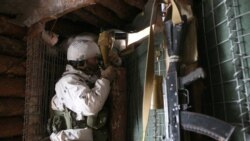The North Atlantic Treaty Organization said Monday its members are sending more ships and fighter jets to eastern Europe in response to Russia’s military buildup along its border with Ukraine.
A NATO statement noted announced deployments or considerations for sending additional troops and equipment from multiple nations, including Denmark, Spain, France, the Netherlands and the United States.
“NATO will continue to take all necessary measures to protect and defend all allies, including by reinforcing the eastern part of the alliance,” NATO Secretary General Jens Stoltenberg said. “We will always respond to any deterioration of our security environment, including through strengthening our collective defense.”
Kremlin spokesman Dmitry Peskov accused the United States and its NATO allies of escalating tensions.
The United States and Britain also announced orders for their embassy staff and family members in Kyiv to leave Ukraine, citing the potential for Russian military action.
Ukraine’s foreign ministry noted the U.S. move but expressed displeasure.
“While we respect right of foreign nations to ensure safety & security of their diplomatic missions, we believe such a step to be a premature one & an instance of excessive caution,” spokesperson Oleg Nikolenko tweeted Monday.
European Union foreign policy chief Josep Borrell said Monday the EU is not planning any similar withdrawals. He spoke to reporters as he arrived for a meeting of EU foreign ministers, which U.S. Secretary of State Antony Blinken was scheduled to join virtually.
“We are not going to do the same thing because we don’t know any specific reasons. But Secretary Blinken will inform us,” Borrell said.
In addition to its order Sunday for the departure of eligible family members from the U.S. Embassy in Kyiv, the U.S. State Department also authorized the voluntary departure of U.S. direct hire employees, asked U.S. citizens in Ukraine to consider departing the country and reissued travel advisories warning against traveling to either Ukraine or Russia.
Asked about the timing of these actions on Sunday evening in Washington, a senior State Department official told reporters they come against the backdrop of reports Russia is planning significant military action against Ukraine.
The State Department official said security conditions, particularly along Ukraine’s borders, in Russia-occupied Crimea and in Russia-controlled eastern Ukraine, are unpredictable and can deteriorate with little notice.
The official said President Joe Biden has said a Russian military invasion of Ukraine could happen at any time, and if there is an invasion, the U.S. Embassy in Kyiv would have limited ability to assist Americans who might want to leave the country.
The State Department officials who briefed reporters declined to give any estimates of the number of Americans working at the embassy in Kyiv or of the number of Americans living in Ukraine.
The State Department officials said these orders are being taken as a “prudent precaution” that in no way undermines U.S. support for the government of Ukraine, and the U.S. Embassy in Kyiv will continue to operate.
The State Department also asked all U.S. citizens in Ukraine to complete an online form so that the State Department may better communicate with them, saying this is especially important for citizens who plan to remain in Ukraine.
Russia has massed 127,000 troops just across its border with Ukraine, a former Soviet republic, sparking fears of an impending Russian invasion. The United States and its European allies have expressed the need to use diplomatic channels to address the crisis and have said a Russian incursion would be met with massive sanctions.
Russia denies it plans to invade Ukraine and has sought guarantees against further NATO expansion in eastern Europe.
Earlier Sunday, Blinken warned Russia that Washington knows “all of the tactics and techniques” that Moscow can deploy to undermine the Ukrainian government but will continue to engage in diplomatic talks in hopes of easing tensions in eastern Europe.
“It is certainly possible that the diplomacy the Russians are engaged in is simply going through the motions and it won’t affect their ultimate decision about whether to invade or in some other way intervene, or not in Ukraine,” Blinken said on NBC’s “Meet the Press” show. “But we have a responsibility to see the diplomacy through for … as far and as long as we can go because it’s the more responsible way to bring this to a closure.”
In a separate interview on CNN’s “State of the Union” show, Blinken ruled out the United States immediately imposing severe economic sanctions on Moscow, which it has vowed to do if Russian President Vladimir Putin invades Ukraine.
“If they’re triggered now,” Blinken said of the possible sanctions, “you lose the deterrent factor.”
Republican Senator Joni Ernst of Iowa, following Blinken on CNN, accused the administration of President Joe Biden of a “doctrine of appeasement” in dealing with Russia over threats to Ukraine.
“The sanctions need to be imposed now,” Ernst said. “President Putin only understands strength and power. We need to have firm resolve.”
Some information for this report came from The Associated Press, Agence France-Presse and Reuters.







